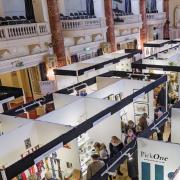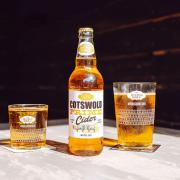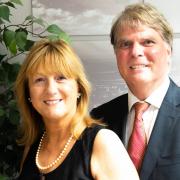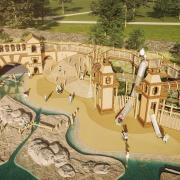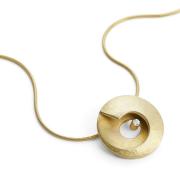Chris Morling is the founder of money.co.uk one of the UK’s most successful comparison websites. He’s spent £3 million on an eccentric renovation of its Cirencester Castle HQ with interior designer Laurence Llewelyn Bowen. And with generous charity donations, eye-watering bonuses and all-expenses-paid holidays for his top performers, this former software programmer may actually be Britain’s best boss

Chris Morling is just back from a four-day trip to west Africa.
His company, financial comparison site money.co.uk, is donating £150,000 to improve an 800-pupil secondary school in Burkina Faso.
Just 16% of children go to school in this landlocked country, pincered by Mali to the north, Niger to the east, Togo and Ghana to the south and the Ivory Coast.
It’s ranked a barrel-scraping 181 out of 187 countries on the UN’s Education Index and is targeted so often by terrorist kidnappers that the British Government advises against all but essential travel to it.
But Chris is not the kind of man to be put off.
“It was incredible,” he said of his visit, his first to the continent. “Very, very enlightening.

“It will, without doubt, stay with me for the rest of my life.
“Africa really brought home to me, what are the priorities in my life?
“Seriously, people get upset when they’re waiting too long for a coffee in Starbucks, and these children have nothing. Not school books. Not shoes. Nothing.”
The tech entrepreneur has been working with charity Giving Africa to provide books, writing materials and technology - including an electronic library - to Bethel Secondary School, where overcrowded, insanitary classrooms meant indoor temperatures soared to a blistering 40C, making learning almost impossible.
Now, Chris has helped set up agricultural and sewing life-skills projects to give children something to take back to their communities, to sustain them long-term.
Tablets charge and download educational material from the web whenever connectivity happens.

Solar-powered batteries provide off-grid power to communities for a monthly subscription cheaper than the cost of the kerosene they currently use.
Blackboards on the gables outside the school allow children to be taught in the shade; a 20-lavatory block has been built and a raised roof provides ventilation in the classrooms.
It’s a far cry from money.co.uk’s multi-million pound, other-worldly renovation of its HQ - the old Cecily Hill Barracks at the gateway to Cirencester Park.
But it’s this bonkers transformation of the Bathurst family fortress that’s fuelled Chris’ charity giving, which currently stands at 10% of money.co.uk’s considerable annual profits.
In 2015, as the company turned over £23.6 million and pre-tax profits stood at £7.9 million, the Sunday Times named it the second fastest growing business in the UK.
“When you’ve got a successful business, you have a responsibility which extends beyond the business,” says Chris.

“We’re lucky enough to be very profitable, and this is absolutely the right thing to do.
“For us, it’s not just about working with the community, or even nationally - which we do. It’s about making a difference internationally.
“It gives us an additional sense of purpose; a vision that drives us forward and goes beyond the company’s vision, which is to help everyone in the UK make the most of their money.
“It adds another level of reason to why we do what we do.”
The press have variously dubbed Chris ‘Britain’s best boss’; ‘serial entrepreneur’; ‘tech visionary’ - and it’s hard to argue with any of these monikers.
“One of my team sent me the details as a joke,” he says, of his decision to buy the Grade II-listed pile, home to Cirencester College until 2013.

“At the time, it seemed like a ridiculous proposition.”
As ridiculous as it was, Chris was persuaded.
Initially, staff moved into half the building, but once he realised if he wanted the business to remain at the forefront of the market, it had to grow exponentially.
So much so that, from a starting staff of seven in 2008, it now boasts 50 employees, including a small commercial team in London.
And so a 14-month, £3 million project led by renowned designer Laurence Llewelyn Bowen began.
The outlay was entirely reasonable, argues Chris - who says a similar-sized property in London would have cost the business five to 10 times more.

Laurence, who lives nearby, famously describes money.co.uk’s new interior as “like being hit round the head with a dirty great tube of Berocca”.
“It’s a cross between a Shoreditch hotel and Google,” says Chris. “But with fewer slides.
“It’s more sophisticated wackiness. Practical, but with a layer of craziness.”
This craziness is writ large in a Star Wars cinema, meeting rooms decorated like ski chalets and ice caves - complete with a wooden sledge for a coffee table - and Rolling Stones-themed loos with lips for urinals.
There’s a games room for pool and table football and arcade games. Pop art is everywhere; dragon murals roar out from orange and purple walls, resplendent with castles.
A psychedelic changing room is put to good use when the in-house basketball and football fixtures run, or staff head to the gym, or evening socials are held - all paid for by the boss, of course.

And the ‘bored room’ features a Lord Tennyson quote in neon lights on the ceiling.
It’s bonkers, bonkers, bonkers. In a genius kind of way.
All 10,000sq ft of barminess is divided into two spaces - half of which is devoted to day-to-day working, the other into wellbeing and chill out areas and the kitchen.
Crucially, Chris did nothing without first consulting all 50 members of staff.
“The process, well, it was stepping stones,” he says.
“The key questions were, what do we want out of an office? How do we want to work? What changes can we make to the business if we make the working day more collaborative, more enjoyable, more efficient?

“By having those conversations with English Heritage and the planners, we were able to knock down a couple of walls and create bigger spaces that help communication.”
Plans had initially been to create several kitchens with water coolers dotted around the building, but Chris vetoed them.
Now, one ultra-modern, open plan space with high-shine units and dazzling lighting flows from the games room with its industrial-style ceiling and retro, Fifties-style chairs.
“I insisted on one kitchen which everyone had to use,” says the entrepreneur, who started out as a consultant at Oracle, a role which saw him develop the first WAP system for Barclays.
“What it does is to force people into bumping into other people they wouldn’t normally bump into while they’re getting a coffee.
“I do it all the time. It improves communication, people just suddenly start talking.”

He says Laurence - famous for his eccentric ideas and flamboyant decor, notable even in the early days of Changing Rooms - was “very good at taking on board our comments”.
“His remit was six rooms,” says Chris, who brought in design firm Interaction to manage the project. “And when we felt he’d overstepped the mark, we told him.
“But I love what he’s done.
“I love the Steam Punk men’s bathroom - not that I spend a lot of time in there, I don’t - for the unexpectedness of it, and I use the lodge and ice cave meeting rooms all the time.
“But I think my favourite space is the one we call Woodland, where the walls are lined with white boards and there’s lots of flexible seating.
“It’s a space to think, and discuss. Having the right space to do the job pays dividends.”

He favours small rooms with comfortable chairs for meetings and there are areas where staff can stand up to work, to stretch their legs and their backs.
There are big spaces, for noisy, collaborative working; funky corners for blue-sky thinking and cosy nooks for when staff need time out to be quiet, to plan.
“When we moved in here, all the walls were magnolia and the carpets hadn’t been changed for 20 years,” says Chris, who lives nearby with wife Gael and their children aged 13, 11 and 10.
He says decorating to this level “simply makes you feel uplifted” - which might explain the mammoth redecoration project he’s currently carrying out at the family home, inspired by the castle’s colour.
With new figures released by the TUC showing at least four million UK workers are routinely putting in a 48-hour week, there’s a strict departure from Britain’s long hours culture at money.co.uk.
“Staff do relax, and we want them to strike the right balance,” says Chris.
“There are fun, chill-out spaces - but it’s not about spending three hours in the games room reading a novel. That just doesn’t happen.
“It’s not about instilling a culture where we spend all our life playing . . .but having spaces where you can enjoy the company of your colleagues and play table football, well that’s a great thing.”
He insists lunch breaks are important and demands staff go home “at a sensible time”.
“There are no staff here who are handcuffed to their desks, because they work hard in the day,” Chris says. “They’ve done their bit. They need to have a life outside work.
“When you’ve got people working til 8pm...well...productivity drops, morale drops. It’s not the way we work.”
With all-expenses paid trips for the most productive staff, bonuses of up to 45% and a dazzling array of perks, recruitment, then, surely, is a breeze?
“Not always,” says Chris. “It’s harder to find certain people to come and work outside London, and attracting and maintaining the best talent is paramount. But we have a rigorous interview process, and we do find the right people.”
Chris still insists on interviewing every candidate himself, once they’ve been vetted by the relevant head of department.
“It’s because they have to fit into our team,” he says. “There’s no point in giving a room full of geniuses a job if they’re not going to be able to work with us. Our team is everything, and collectively, that’s what’s driven our growth and what will continue to do in future. We work together, we play together to drive the success of the business. If they’re happy, I’m happy.”
Chris Morling: three things which drive our success:
1. We employ the right team
My team is everything. The renovation of the castle has helped growth, not in an obvious way, but because we collectively work and play together to drive the success of the business. The right people in the right roles in the right workspaces is essential. Some people naturally work better in isolation. Others, in louder more collaborative environments. What the renovation has done is allow that to happen naturally, and it does help creativity.
2. We focus on efficiency through technology
There’s a focus on IT because that’s my background. I always make sure we have the right technology to support the business, because it allows us to do more with our people. Staff are just more interesting because they don’t have to do those slow, laborious tasks that can be done by a computer. And it means we’re a very scaleable business.
3. We’ll do anything to help our customers
The lengths we go to to help our customers are the same, however many hits we get on our website. Typically, it’s between two and three million a month. We compare over 17,000 financial products and offer consumers the best tools and information in the industry. That’s our mission.








